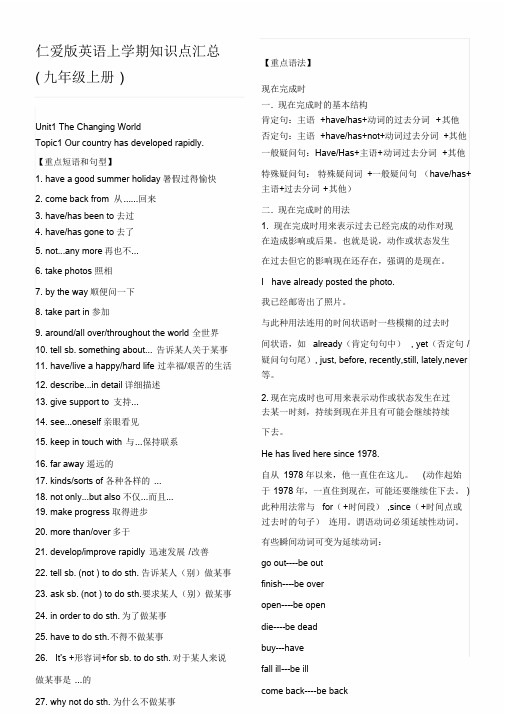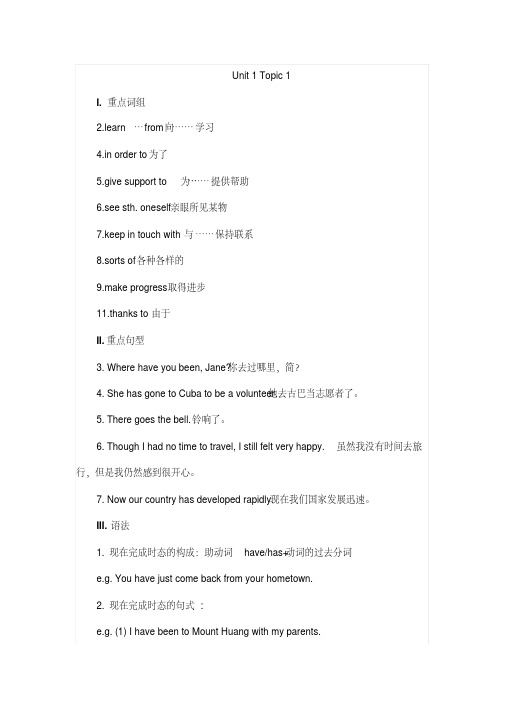仁爱英语九年级上总复习资料
- 格式:doc
- 大小:63.50 KB
- 文档页数:13

仁爱版英语九年级上册知识点总结汇总仁爱版英语九年级上册知识点汇总九年级上册(重点短语、句型和语法 )Unit1TheChangingWorldTopic1Ourcountryhasdevelopedrapidly.【重点短语和句型】1.haveagoodsummerholiday暑假过得愉快2 ebackfrom 从..... .回来3.have/hasbeento去过4.have/hasgo neto 去了5.not...a nymore再也不...6.takepho tos照相7.bythewa y顺便问一下8.takepartin参加9.around/allover/throughouttheworld全世界10.tellsb.somethingabout...告诉某人关于某事11.have/liveahappy/hardlife 过着幸福/艰苦的生活12.describe...indetail详细描述13.givesupportto支持... 14.see...oneself亲眼看见15.keepintouchwith与...保持联系16.faraway遥远的1/26仁爱版英语九年级上册知识点总结汇总17.kinds/sortsof各种各样的...18.notonly...butalso不仅...而且...19.makeprogress取得进步20.morethan/over多于21.develop/improverapidly迅速开展/改善22.tellsb.(not)todosth.告诉某人〔别〕做某事23.asksb.(not)todosth.要求某人〔别〕做某事24.inordertodosth.为了做某事25.havetodosth.不得不做某事26.It's+形容词+forsb.todosth.对于某人来说做某事是...的27.whynotdosth.=whydon ’tyou为do什sth么不做某事28.succeed/besuccessfulindoingsth.成功地做某事29.dreamaboutdoingsth.梦想做某事30.see/hearsb.do/doingsth.看见/听见某人做/正在做某事【重点语法】现在完成时一.现在完成时的根本结构肯定句:主语+have/has+Ved(动词的过去分词)+其他否认句:主语+have/has+not+Ved(动词的过去分词)+其他一般疑问句:Have/Has+主语+Ved(动词的过去分词)+其他2/26仁爱版英语九年级上册知识点总结汇总特殊疑问句:特殊疑问词+一般疑问句语序〔have/has+主语+过去分词+其他〕,把划线词去掉二.现在完成时的用法现在完成时用来表示过去已经完成的动作对现在造成影响或后果。

仁爱版英语上学期知识点汇总(九年级上册)Unit1 The Changing WorldTopic1 Our country has developed rapidly.【重点短语和句型】1. have a good summer holiday 暑假过得愉快2. e back from 从......回来3. have/has been to 去过4. have/has gone to 去了5. not...any more 再也不...6. take photos 照相7. by the way 顺便问一下8. take part in 参加9. around/all over/throughout the world 全世界10. tell sb. something about... 告诉某人关于某事11. have/live a happy/hard life 过幸福/艰辛的生活12. describe...in detail 详细描述13. give support to 支持...14. see...oneself 亲眼看见15. keep in touch with 与...保持联系16. far away 遥远的17. kinds/sorts of 各种各样的... 18. not only...but also 不仅...而且...19. make progress 取得进步20. more than/over 多于21. develop/improve rapidly 迅速开展/改善22. tell sb. (not ) to do sth. 告诉某人〔别〕做某事23. ask sb. (not ) to do sth. 要求某人〔别〕做某事24. in order to do sth. 为了做某事25. have to do sth. 不得不做某事26. It's +形容词+for sb. to do sth. 对于某人来说做某事是...的27. why not do sth. 为什么不做某事28. succeed/be successful in doing sth. 成功做某事29. dream about doing sth. 梦想做某事30. see/hear sb. do/doing sth. 看见/听见某人做/正在做某事【重点语法】现在完成时一. 现在完成时的根本构造肯定句:主语+have/has+动词的过去分词+其他否认句:主语+have/has+not+动词过去分词+其他一般疑问句:Have/Has+主语+动词过去分词+其他特殊疑问句:特殊疑问词+一般疑问句〔have/has+主语+过去分词+其他〕二. 现在完成时的用法1. 现在完成时用来表示过去已经完成的动作对现在造成影响或后果。

Lassie版权所有Unit1 The Changing WorldTopic1 Our country has developed rapidly.【重点短语和句型】1.have a good summer holiday 暑假过得愉快2. come back from 从......回来3. have/has been to 去过(主语已经回来)4. have/has gone to 去了(主语还没回来)5. not...any more 再也不...6. take photos 照相7. by the way 顺便问一下8. take part in +活动/比赛;join +组织/团体9. around/all over/throughout the world 全世界10. tell sb. something about... 告诉某人关于某事11. have/live a happy/hard life 过着幸福/艰苦的生活12. describe...in detail 详细描述13. give support to 支持...14. see...oneself 亲眼看见15. keep in touch with 与...保持联系16. far away 遥远的(常做后置定语)17. kinds/sorts of 各种各样的...18. not only...but also 不仅...而且...19. Make rapid/big progress 取得快速/大的进步20. more than/over 多于21. develop/improve rapidly 迅速发展/改善22. tell sb. (not ) to do sth. 告诉某人(别)做某事23. ask sb. (not ) to do sth. 要求某人(别)做某事24. in order to do sth. 为了做某事25. have to do sth. 不得不做某事26. It's +adj.+for/of sb. to do sth. 对于某人来说做某事怎么样表示事物的性质或特征时用for,表示人的品质或性格时用of。

仁爱版英语上学期知识点汇总【重点语法】( 九年级上册)现在完成时一. 现在完成时的基本结构Unit1 The Changing WorldTopic1 Our country has developed rapidly. 肯定句:主语+have/has+动词的过去分词+其他否定句:主语+have/has+not+动词过去分词+其他一般疑问句:Have/Has+主语+动词过去分词+其他【重点短语和句型】特殊疑问句:特殊疑问词+一般疑问句(have/has+ 1. have a good summer holiday 暑假过得愉快主语+过去分词+其他)2. come back from 从......回来二. 现在完成时的用法3. have/has been to去过1. 现在完成时用来表示过去已经完成的动作对现4. have/has gone to去了在造成影响或后果。
也就是说,动作或状态发生5. not...any more 再也不...在过去但它的影响现在还存在,强调的是现在。
6. take photos照相I have already posted the photo.7. by the way 顺便问一下我已经邮寄出了照片。
8. take part in 参加与此种用法连用的时间状语时一些模糊的过去时9. around/all over/throughout the world 全世界间状语,如already(肯定句句中), yet(否定句/ 10. tell sb. something about... 告诉某人关于某事疑问句句尾), just, before, recently,still, lately,never 11. have/live a happy/hard life 过幸福/艰苦的生活等。
12. describe...in detail 详细描述2. 现在完成时也可用来表示动作或状态发生在过13. give support to 支持...去某一时刻,持续到现在并且有可能会继续持续14. see...oneself 亲眼看见下去。

Unit 1 Topic 1I. 重点词组向……学习2.learn…from…4.in order to为了为……提供帮助5.give support to… 6.see sth. oneself 亲眼所见某物7.keep in touch with 与……保持联系8.sorts of各种各样的9.make progress 取得进步11.thanks to 由于II.重点句型3. Where have you been, Jane? 你去过哪里,简?4. She has gone to Cuba to be a volunteer.她去古巴当志愿者了。
5. There goes the bell. 铃响了。
6. Though I had no time to travel, I still felt very happy.虽然我没有时间去旅行,但是我仍然感到很开心。
7. Now our country has developed rapidly.现在我们国家发展迅速。
III.语法1. 现在完成时态的构成:助动词have/has+动词的过去分词e.g. You have just come back from your hometown.2. 现在完成时态的句式:e.g. (1) I have been to Mount Huang with my parents.(2) I haven’t seen him for a long time.(3) Where have you been?(4) ——Have you ever cleaned a room? ——Yes, I have. / No, I haven’t.3. have/ has been与have/has gone 的区别have/has been to sp.表示曾经到过某地—— have/has gone to sp.表示已经去了某地e.g. (1) I have been to Mount Huang with my parents. (2) She has gone to Cuba to be a volunteer.Unit 1 Topic 2I. 重点词组1. get lost 迷路2. each other 彼此3.at least 至少4take place发生5because of 因为6.be strict with sb. 对某人严格要求7.carry out 实行8.be short of 缺乏9.take measures to do sth.采取措施做某事作为……而著名10.be known as… 在……方面起作用11.work well in doing…12.a couple of 一些13keep up with赶上,跟上II.重点句型1. Have you found him yet? 你已经找到他了吗?2. ——I really hate to go shopping. 我的确讨厌购物。

仁爱版九年级上册英语知识点一、Unit 1 The Developing World。
1. 重点单词。
- describe:v. 描述;形容。
例如:Can you describe your new school?- provide:v. 提供;供应。
常用搭配:provide sb. with sth.或者provide sth. for sb.,如:The school provides us with a good learning environment.- remain:v. 保持;依然。
可作系动词,后接形容词等作表语,例如:He remained silent at the meeting.- increase:v. & n. 增加;增长。
increase by表示“增加了……”,increase to表示“增加到……”。
2. 重点短语。
- be short of:短缺;缺乏。
例如:The area is short of water.- so far:到目前为止,常与现在完成时连用。
如:So far, we have learned a lot in this semester.- take place:发生,通常指有计划、有安排地发生,没有被动语态。
例如:The sports meeting will take place next week.3. 重点句型。
- It is + adj. + for sb. to do sth.:对某人来说做某事是……的。
例如:It is important for us to protect the environment.- have/has been to与have/has gone to的区别:- have/has been to表示“去过某地(已经回来)”,例如:I have been to Beijing twice.- have/has gone to表示“去了某地(还没回来)”,例如:He has gone to Shanghai on business.二、Unit 2 Saving the Earth。
仁爱英语中考九年级全一册知识点总复习整理版仁爱英语中考九年级全一册知识点总复习整理版33.我们应尽一切努力保护环境We should do everything we can to protect the environment.34.不要在公共场合到处吐痰。
Don’t spit anywhere in public.35.大家知道,没有人喜欢污染。
As we know, none of us likespollution.36.人类逐渐意识到保护动物的重要性。
Humans have come to realize the importance of protecting animals.Unit 2Topic 31.环境保护environmental protection 2为......工作work for (3)宣传有关…… spread the message about…4减少浪费/ 空气污染reduce the waste/ air po llution 5……的两面both sides of … 6塑料袋plastic bags7鼓励某人做某事encourage sb. to do sth. 8省钱/ 能源/ 电save money/ energy/ electricity 9应当做某事be supposed to do sth.10应该做某事(语气较强) ought to do sth.11关灯turn off the lights 12短途旅行travel a short distance 13请准时Please be on time.14把垃圾分类sort the garbage15在沙滩上on the beach 16从……获得能量produce power from…17被广泛应用be widely used 18发动汽车run the car 19把…向前/向下推push…forward / down20把…向上拉pull…up 21通过做某事发电produce electricity by doing sth.22淋浴take a shower 23短途旅行make a short journey 24捡起垃圾pick the litter up 25再努力try harder26你想成为一个更环保的人吗?Would you like to be a greener person?27每个人都应该那样做。
Unit 1 Topic 1一、重点短语1. feel sorry for …同情2. learn … from习3. in the past/ future将来4. in detail5. have no chance to do sth. 某事6. afford ( to do) sth某事7. give support to sb.支持8. with the development of 展9. sleep in the open air对……深表从……当中学在过去/ 在详细地没有机会做担负得起(做)给某人帮助/ 随着……的发在户外睡觉10. used to do sth.某事11. fall ill得病/ 患病12. divide …into …把... 分成……13. thanks to 多亏; 幸亏;由于14. with the help of …在……的帮助下、重点句型1. Parents couldn 't afford education for their children. 父母供不起孩子上学。
afford 常与can, could 或be able to 连用,尤其用于否定句或疑问句,表“负担得起(做)某事;抽得出(时间)”“(can 't/ couldn 't) afford (to do) sth. ”2. Our government gives support to poor families. 我们的政府能为贫困家庭提供帮助。
give support to sb.= give sb. support 为某人提供帮助/ 支持search sp. for sth. 搜查某地寻找某物support 作动词时表“供养;支持;支撑”3. Why not go and search the Internet for some information?为什么不上网查找相关信息呢?search sp. for sth. 搜查某地寻找某物search sb. for sth. 搜身查找某物search for sth./ sb.= look for sth./ sb. 搜寻某物/ 某人;4. One part was used to help support my family, to help send my elderbrother to school. 一部分钱用来供养全家人, 另一部分用来供哥哥上学.a) one part …the other (part) ------------ 部分 .... 另一部分 ....b) elder brother 哥哥elder 作形容词时, 是old 的比较级, 一般表示家庭成员出生的顺序, 在句中只能作定语, 可与than 连用; 而older 表年龄的比较, 可与than连用.5. sth. happen to sb. 某人发生了某事三、重点语法(一)现在完成时:表示过去已经发生或已经完成的某一动作对现在造成的影响或结果。
Unit 1 Topic 1知识点Section A一、现在完成时:表示过去已经发生或已经完成的某一动作对现在造成的影响或结果。
即“过去的动作+ 现在的结果”,强调结果。
E.g.:I have bought a new bike. (= I bought a new bike, and I have a new bike now.)我已经买了一辆新的自行车。
(强调我现在有了一辆新车。
)构成形式:主语+助动词have / has + 动词的过去分词1.肯定句: I have seen the film.2.否定句:I haven’t seen the film.3.一般疑问句:Have you seen the film?回答:Yes, I have. /No, I haven’t.4.特殊疑问句:What have you done?二、have/ has been to +某地,(到过某地,说话时人已经回来了。
)have /has gone to +某地,(说明去了某地,说话时人还没回来。
)如:I have been to Beijing twice. 他去过北京两次。
---- Where is Jim? 吉姆在哪儿?---- He has gone to the library?他去图书馆了。
e back from从…. 回来2. be happy to do sth.很高兴干某事3.take place发生(按计划发生)happen 发生(偶然发生)4.by the way 顺便问一下5.There goes the bell. 铃响了!(倒装句)倒装句:副词here,now, there, then开头;谓语动词:be,come,go,follow;主语:名词,构成完全倒装句!(主语代词,构成半倒装句:Here he comes! 他来了!)6.take photos 照相7.so… that如此…以至于8.too…to do…太…而不能干…9.not +adj.+enough to do sth.不足够…能干….10.for a long time 长时间11.have/has been to曾经去过某地,回来了have/has gone to去某地了,还没有回来have/has been in/at一直在某地Section B12.take part in=join in参加某种活动join参加某种组织13.in a disabled children’s home在残疾儿童之家14.learn…from…向…学习15.have no time to do sth.没时间干…16.put on上映,穿上18. Though I had no time to travel, I still felt very happy this holiday! 尽管我没时间去旅游,但这个假期我仍然感到很愉快。
(完整版)仁爱英语九年级上册知识点归纳(完整版)仁爱英语九年级上册知识点归纳1.take photos 照相2.learn…from…向……学习3.in detail 详细地4.in order to为了5.give support to… 为……提供帮助6.see sth. oneself 亲眼所见某物7.keep in touch with 与……保持联系8.sorts of各种各样的9.make progress 取得进步10.draw up 起草;拟定11.thanks to 由于(完整版)仁爱英语九年级上册知识点归纳1. In one place I saw children working for a cruel boss.在一处我看到了孩子们为残忍的老板干活。
2. I felt sorry for them.我对他们深表同情。
3. Where have you been; Jane? 你去过哪里;简?4. She has gone to Cuba to be a volunteer.她去古巴当志愿者了。
5. There goes the bell. 铃响了。
6. Though I had no time to travel; I still felt very happy.虽然我没有时间去旅行;但是我仍然感到很开心。
7. Now our country has developed rapidly.现在我们国家发展迅速。
III.语法1. 现在完成时态的构成:助动词have/has+动词的过去分词2. 现在完成时态的句式:e.g. (1) I have been to Mount Huang with my parents.(2) I haven’t seen him for a long time.(3) Where have you been?(4) ——Have you ever cleaned a room?——Yes; I have. / No;I haven’t.3. have/ has been与 have/has gone 的区别have/has been to sp.表示曾经到过某地—— have/has gone to sp.表示已经去了某地e.g. (1) I have been to Mount Huang with my parents. (2) She has gone to Cuba to be a volunteer.Unit 1 Topic 2(完整版)仁爱英语九年级上册知识点归纳1. get lost 迷路2. each other 彼此3.at least 至少4take place发生5because of 因为6.be strict with sb. 对某人严格要求7.carry out 实行8.be short of 缺乏9.take measures to do sth.采取措施做某事10.be known as… 作为……而著名11.work well in doing…在……方面起作用12.a couple of一些13keep up with赶上;跟上(完整版)仁爱英语九年级上册知识点归纳1. Have you found him yet? 你已经找到他了吗?2. ——I really hate to go shopping. 我的确讨厌购物。
学习必备欢迎下载九年级上Units l一2半期考复习资料词汇梳理1.feel sorry for3.get a good education 5.give support to sb.7.keep in touch with9. succeed in doing sth.11.With the development of...13.have/live a...1ife 15.see sb.do/doing sth.17.draw up19.write down21.in the open air23.less than25.the developing countries 27.carry out29.take measures to do 31.keep/catch up with 33.so far35.as a matter of fact37.in need 39.be famous for41.Provide sb.with sth./provide sth.for sb.42.at home and abroad 44.thousands of46.my goodness48.do harm to/be harmful to 50.can’t stand doing52.as a result54.here and there56.go deaf/have hearing loss/lose one's hearing57.day by day59.in danger(of…)61.cut down63.human beings65.come into being67.take away69.take up71.travel a short distance/make a short journey73. ought to学习必备欢迎下载75. come up77.on time 79.neither...nor...80.reform and opening-up 2.in order to4.by the way6.make progress 8.what's more 10.divide...into...12.with the help of…14.learn from...16.thanks to18.check over20.far away22.in detail24.call up26.the developed countries 28.be short of30.work well in 32.belong to34.a couple of 36.break out 38.according to40.pay for43.in the past/last few years 45.millions of47.make much noise 49.manage to do sth.51.in many ways53.as we know55.care for58.in the beginning60.come to realize62.cut off64.keep/prevent/stop…from doing 66.change/turn into68.the greenhouse effect70.refer to72.be supposed to do sth.74.throw away76.for long78.pick up【辨析】take part in,join in和join 都有“参加"的意思,但是用法不尽相同。
take part in参加某项活动,侧重强调大型正式的活动。
join in参加某项活动。
后面接的宾语一般是表示竞赛、娱乐、游戏等活动的名词或v.-ing join sb.in还可表示“加入某人做某事”。
join强调加入某一组织,并成为其中的一员。
【精练1】用take part in,join in和join的适当形式填空.1.My brother_________he Party in 2002.2.My wife________me_________thanking you for the gift.3.We are playing football.Do you want to____________?4.I didn’t want to___________the ceremony.5.He_______________the football club last month.【辨析2】thanks to,because of与becausethanks to意为“多亏了,由于”,常带有感谢之意,表示由于某个人或某物的存在才有某种好的结果,后跟名词、代词、动名词及名词性短语作宾语。
注意to是介词。
because of是普通用法,意为“由于”,表示理由,没有感情色彩,后跟名词、代词、动名词等作宾语。
beeause也是普通用法,意为“因为”,常用来回答why引起的特殊疑问句,没有感情色彩,后跟原因状语从句。
【精练2】用thanks to,because和because of填空。
1.People in the past couldn’t have a happy life_______the war.2.He didn’t get home on time_________it rained heavily.3._______________the fireman,the baby was saved.【辨析3】provide,offer与supply这组动词都可表示“提供,供给”。
区别是:provide主要指提供所需之物,尤其是生活必需品,可接双宾语:provide sb.with sth./provide sth.for sb.offer指主动提供帮助、服务或东西,常接动词不定式作宾语,也可接双宾语:offer sb.sth.supply主要指供给国家、群众、工厂、城市、市场等所需要或所要求之物,以部队为对象时,往往只供给生活必需品,而不指武器。
常用结构:supply sb.with sth./supply sth. to sb. 【精练3】用provide,offer和supply的适当形式填空。
1.He__________to help me with my English.2.Mother___________her with a house in Fuzhou.3.The school__________books to the children.【辨析4】take place与happenhappen和take place都有“发生”的意思,前者是不及物动词,后者是不及物短语动词。
happen用于偶然发生的事件,其后跟宾语时先加to。
take place通常用于已计划、安排或人们积极参与的事情。
还有“举行”的意思。
【精练4】用take place和happen的适当形式填空。
1.How did the accident___________?2.Do you know what_________to him?3.The school sports meeting____________next Friday.4.I___________to pass by.5.Great development_________in China in the past 30 years.【辨析5】pay,spend,cost和take这几个词都可以表示“花费”。
区别是:spend和pay的主语只能是人;cost和take的主语是物或事。
此外cost和take还可以用动词不定式作真正主语,而用it作形式主语。
pay的搭配范围最窄,只接表示金钱的词,常与for连用,意为“付款”。
cost的搭配范围最宽,除金钱外还可以表示时间、劳力、精力,甚至生命等词。
spend后接时间或金钱,spend…on sth./(in)doing sth.take常与时间连用,常用it作形式主语:lt+takes/took+sb.+一段时间+to do sth.。
【精练5】用pay,spend,cost和take的适当形式填空。
1.The book__________me 50 yuan.2.How long does it__________you to finish your homework every day?3.I_____________100 yuan for the painting.4.I_____________l00 yuan on the painting.5.How long do you___________practicing the guitar every day?【辨析6】ever,never,just,already,yet这组词常和现在完成时连用。
ever意为“曾经”,表示到现在为止的任何时候,多用于疑问句中。
never意为“未曾,从来没有”,否定词。
just意为“刚刚”,一般用于肯定句中。
already意为“已经”,多用于肯定句,可放在句中,也可放在句末。
yet意为“已经,至今,还”,多用于否定句和疑问句,常放在句末。
【精练6】用ever,never,just,already,yet填空.1.--Have you_______visited the science museum? ------Yes,several times.2.Hurry up!It's_________a quarter to eleven!3.---Have you had breakfast_________?--Yes,I have.4.I have_________seen such a wonderful film before.5.She said,“How nice to meet you here!I've_________arrived by train.”【辨析7】manage to do sth.与try to do sth.这两个短语都表示“努力做某事”,区别是: manage to do sth.强调经过努力,最后成功了。
try to do sth.只表示努力去做某事.最后不一定达到目的。
【精练7】用manage或try的适当形式填空。
1.Yao Ming has_____________to be one of the best basketball players in the world.2.He______________to solve the problem,but it's really too hard for him.3.They_____________to win the match in the end.We are all proud of them!综合运用根据句子意思及首字母写出适当的单词。